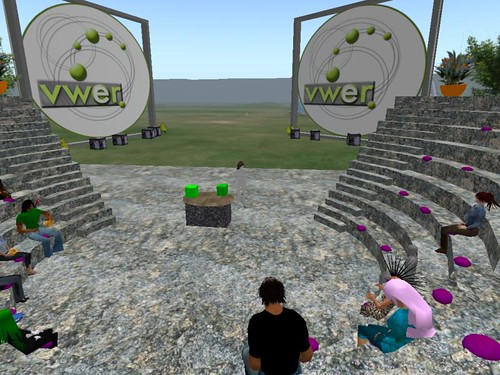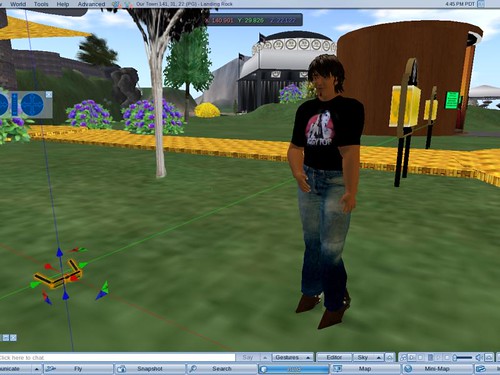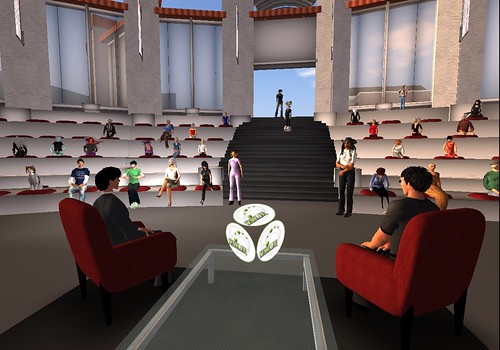

Car: 1959 CaddyMusic: "Kind of Blue" by Miles DavisEra: 1950s-1965 (I reckon)The road trip this month took me to Old Willowdale, a sim that seeks to capture the lost innocence of childhood and an idealized version of community that, depending on one's upbringing, might have been real life suburbia or a small US town before The Vietnam War. As a writer who often comments on how contemporary suburbia, atomized into carefully marketed "communities" and car-dependent, is doomed by the advent of Peak Oil, I kept finding myself smiling with pleasure at this innocent place. If Willowdale were a real place, it would, in fact, be sustainable during an oil crisis.
I was also struck by the wave of familiarity as I toured the area. It seemed very close to my sepia-toned memories of Cary Street in Richmond, in the 1960s when it was a working class neighborhood. Some of my neighbors never left a 10-block area because everything one needed could be found there.


In Willowdale, as in my old 'hood, there are children, lots of them in fact. I admit some trepidation when encountering child avatars, but on arrival at the sim, the rules for visitors and residents of the region set boundaries that are very clear:
The defining word for Willowdale is "wholesome". Families here are healthy and functional. If it would fit into an episode of Leave it to Beaver, it's fine here. Kids can and will misbehave, even up to and including fistfights on the playground, but that's about the limit. Drugs and guns are not part of Willowdale. Neither are sex, sexual conversations, revealing clothes, etc., especially when there are children around.In fact, anyone "whose visible groups, picks, or other profile info are largely sexual in nature" can be banned from the region. Profiles are public, and Willowdale, like my RL neighborhood, enforced a code that anything illegal or immoral would not be permitted in public. Only after white flight from my neighborhood in the early 70s, and decay of the retail district, did those rules change.
Naturally, being me, I looked for contradictions in the virtual space. They were hard to find! I suppose an ad, in a shop on the main street, for a training bra for teenage female avatars might qualify, but it seemed a lot tamer than 50 other things I could find in moments in any mainland sim, even PG ones.


I drove Willowdale's streets at a quiet time of day, when only a few folks were about. I did find Pyro Paragorn.
We talked for a while, both in-character (me as a tourist) and out of character, about the place. Pyro roleplays a lot in SL, including the Tombstone Western sim I've visited on several occasions (and no paragon of virtue, Tombstone!).
Iggy: tell me why [Willowdale]'s so nice
Pyro shrugs "It's just a great place to hang out with your family and there's alot to do here"
Willowdale includes a movie theater, games for adults and children, hiking, even Sunday school. After this meeting, as Pyro recommended I sent a few questions about Old Willowdale to Kya Muircastle, who roleplays a child at the sim. She is on the town council as well.
Iggy: What inspired Willowdale and what keeps it going?
Kya: Well, I'm fascinated by the ability to be someone different here! There's a fairly large community of child avatars in SL, but at least when Willowdale came into being, what I saw missing was a place where we could really explore the experience of being a kid, growing up in a world that's designed by and for adults. So I set out to make some places that's friendly to role-playing as children and families, but also feels authentic and real.
That's been a loose goal, though. What really keeps Willowdale going now is the sense of community. We all know each other, and enjoy seeing each other on a regular basis and sharing our lives.
Iggy: Nostalgia seems a big factor. What else brings folks here?
Kya: I hope that a lot of what brings people here is the creative things we do. We strive to do things that no one else does in SL. I've really enjoyed when we do a theater program, so in a sense, we're role-playing as people acting in a play! We have a sunday school in our church, which is also role-playing in the best sense, in that we're finding something that some part of ourselves can be involved in. Another thing that often draws people is when Soki reads books in the library (using voice chat), and we get together for games.
Iggy: How often do you have to deal with griefers?
Kya: There's griefing, and then there's griefing! We don't often see the all-out griefer that's just here to crash the sim or harrass people. But we do see people who want to do things without any regard for the well-being of the community. It's not an overwhelming problem, though. We tend to be quick to ban people and move on.
Iggy: What do you hope residents will take into RL from a setting like this?
Kya: I don't honestly know. We're just here to have fun, and build interesting relationships with other people. Everyone's coming from such a vastly different place, and I think it would be pretentious of me to say what they ought to get out of it.
Kya might be too modest to speculate, but I, of course, never hesitate to do so. Old Willowdale made me see the entire family role-playing scene in a new light. I know that, in appropriate settings, I probably won't have the negative reaction I once did to child avatars. I doubt that I'll return any time as an 8-year-old Iggy; every school day was a misery to me. I recovered nicely, however; high school was a delight and college even better.
The allure of being a child again must be strong, however, for many adults, as must be the roleplay of being a parent. We don't often read William Wordsworth's poetry these days, as I did in college, but after some hunting I tracked down his "
Intimations of Immortality" online.
Perhaps like the poet and those of us distanced from childhood or raising children, Willowdale's residents through Second Life "Can in a moment travel thither, / And see the Children sport upon the shore," once again.


The price we pay growing up, and the toll time takes upon us, were with me during my road trip. In a time of rage and illogic and uncertainty in the offline world, it felt good to be somewhere wholesome.













